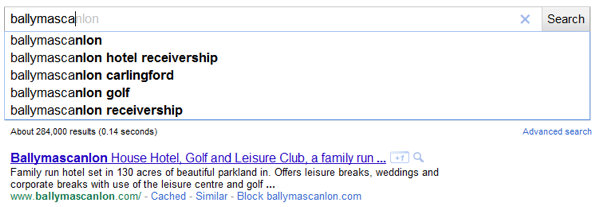
When Google users type in the name, or even just the first part of the name, of Ballymascanlon, a hotel located in North Dublin County, Ireland, one of the top search suggestions from Google Autocomplete (formerly Google Suggest) is “Ballymascanlon hotel receivership.”
Receivership, or the legal state of having forfeited control of a business or estate to a receiver to allow for the attempted recovery of a debt, is a big concern for those who book expensive hotel suites in advance; while the business will still operate in receivership, the next step in the legal process is to liquidate the assets of the company.
Ballymascanlon was made aware of the issue thanks to “tearful telephone calls from brides-to-be” who were concerned that their reservations may be at risk, according to The Next Web.
Here’s the problem: Ballymascanlon isn’t in receivership, nor have they ever been. The implication that they are or were is certainly concerning to those who have reservations or are thinking of making some, but it’s not based on any actual financial struggles for the company. Ballymascanlon is understandably worried that the suggested query is hurting their business.
But it’s not something Google planted in the search field, either. Rather, the autocomplete suggestion in the result of common search queries; someone, or some group, has been inquiring on whether Ballymascanlon is in receivership – and concerns raised by the Google suggestion itself may be causing a vicious cycle on the issue.
Ballymascanlon made numerous attempts to have Google remove the autocomplete suggestion, including contacting Google customer support multiple times, having the company lawyer draft letters to Google on three separate occasions, and sending a cease and desist order. None of these attempts was successful, so Ballymascanlon is turning to the court to try to force a resolution.
According to The Open Algorithm, the hotel is “only seeking an injunction against Google using the suggestion and their legal fees, Ballymascanlon aren’t looking for any compensation and as such have no monetary motives behind the court case.”
A Brief History of Autocomplete’s Legal Battles
Google has fought this battle several times, although never in Ireland. While the court cases have been dragged out and haven’t resulted in many large financial penalties for Google, almost all cases have resulted in a manual alteration in the autocomplete fields. A few cases of note include:
- An Italian court case that set a legal mandate that Google remove any Italian autocomplete suggestions that were defamatory; the defamed parties must still contact Google to have the results removed.
- An Argentine case that ruled that Google must remove any autocomplete suggestions that result in anti-Semitic or otherwise offensive queries.
With this broad legal precedent, it seems likely Google will lose the case. However, as the ruling is happening in a new region, there’s always the chance for different results and a new set of legal precedents.
